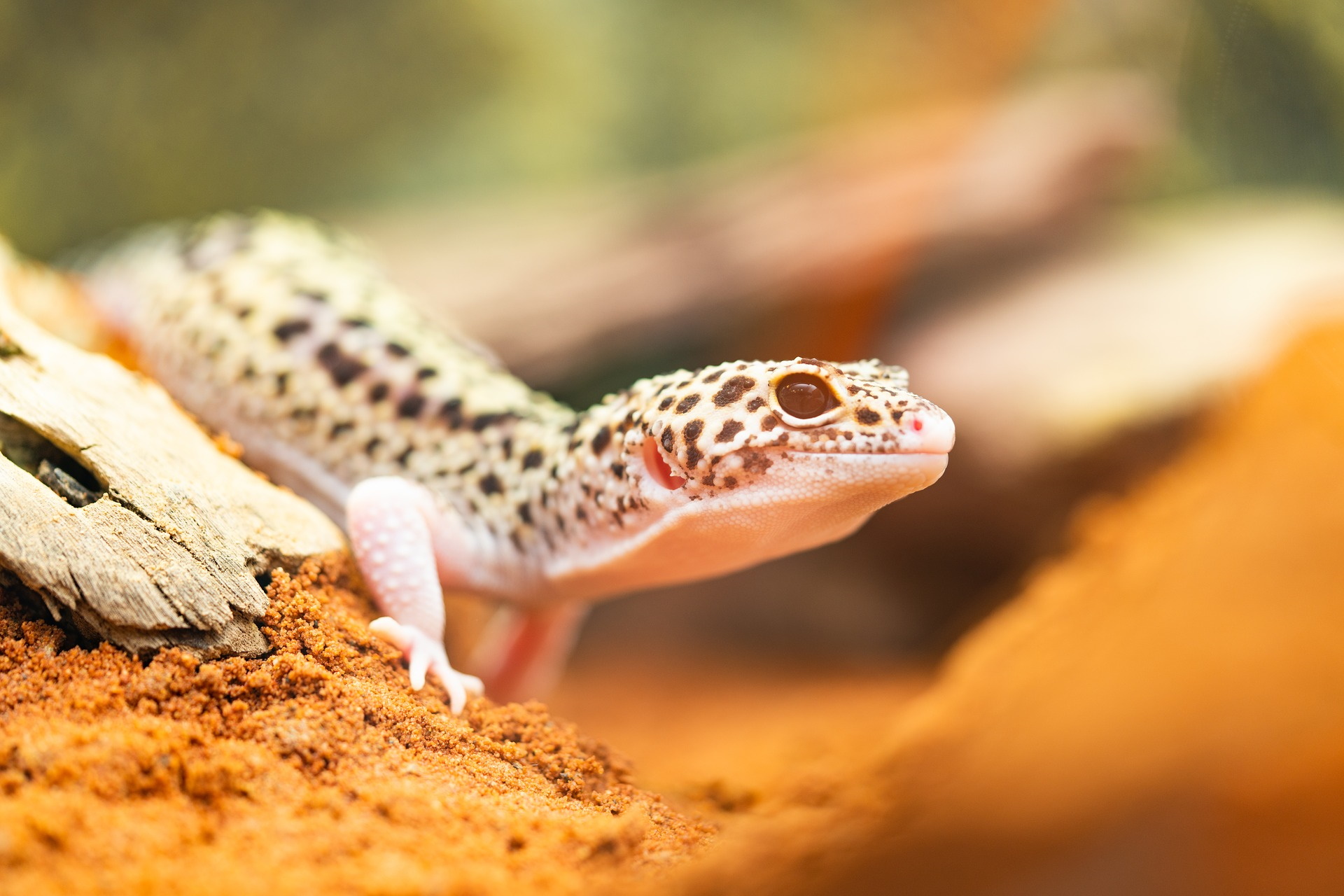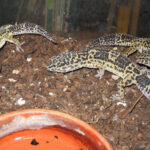Leopard geckos are popular pet lizards known for their docile nature, ease of care, and wide range of morphs and colors. These geckos communicate through body language and vocalizations. While leopard geckos are usually quite quiet, they can make various noises to express different emotions and needs. Understanding these noises can help provide better care for a leopard gecko. In this article we talk about 5 common noises Leopard geckos can make.
Table of Contents
Squeaking

Squeaking is one of the most common noises leopard geckos make. These high-pitched squeaks sound similar to a dog toy being squeezed. Squeaking often signals fear, distress, or pain in leopard geckos.
Common reasons for squeaking include:
- Being handled when they don’t want to be. Leopard geckos may squeak in protest if they are picked up against their will.
- Feeling threatened or attacked. Predators in the wild or overly aggressive cage mates in captivity can cause a leopard gecko to squeak in distress.
- Experiencing pain from injury or illness. Issues like metabolic bone disease, infections, or falls can all elicit painful squeaking.
- Being startled. Quick movements or loud noises can startle a leopard gecko into squeaking.
Squeaking should not be ignored as it indicates your gecko is stressed or hurt. Try to identify and remove the source of fear or discomfort prompting this noise. Consulting an exotic vet is recommended if squeaking persists or seems related to health issues.
Barking
Leopard geckos also produce a barking sound, reminiscent of a small dog. This abrupt, raspy vocalization tends to signal irritation, anger, or dominance displays.
Reasons leopard geckos may bark include:
- Establishing territory. Male geckos often bark when defending their preferred hideouts.
- Showing aggression. Both males and females may bark to appear threatening during confrontations over territory, food, or mates.
- Expressing frustration. Excessive handling, cage overcrowding, or other bothersome issues can cause geckos to bark their displeasure.
- Responding to reflections. The appearance of another gecko in a reflection or glass tank wall is sometimes met with aggressive barking.
Barking is more common in mature males but can occur in juveniles and females too. While some territorial barking is normal, excessive barking warrants inspection for stressors in the gecko’s environment. Removing tank reflections, providing multiple hides, and handling geckos gently can help reduce problematic barking.
Clicking
Clicking or clucking sounds are made when leopard geckos rapidly move their jaws together. It resembles the noise made when clicking tongs or castanets together.
Clicking often indicates positive emotions in leopard geckos like pleasure, excitement, or interest:
- Greeting owners. Leopard geckos sometimes click happily upon seeing familiar caretakers approach their tank.
- Showing interest in food. The anticipation of feeding time can stimulate clicking as geckos get excited for their prey.
- Enjoying physical contact. Gentle handling or petting may elicit mild clicking noises from content geckos.
- Exploring environments. New areas and stimuli can also trigger curious clicking and clucking in leopard geckos as they investigate.
So clicking tends to signal a happy, healthy gecko. It especially occurs during rewarding situations or novel experiences. Paying attention to when your gecko clicks can reveal its favorite foods, toys, and types of handling.
Hissing
An aggressive hiss is another common leopard gecko vocalization. This is an elongated “shhh” sound often coupled with a sudden lunge or bite at the perceived threat.
Reasons for hissing include:
- Warning rivals away. Hissing communicates to other geckos that “this is my territory!”.
- Fending off predators. In the wild, leopard geckos hiss when confronted with snakes or other enemies.
- Responding to handling issues. Geckos may hiss if waking up grumpy or if they smell prey on your hand and mistake a finger for food.
- Expressing fear. Hissing can also indicate a scared gecko rather than an aggressive one. Intense stimuli can frighten some into defensive hissing.
Take hissing seriously by removing whatever is causing your gecko distress. But don’t automatically interpret it as aggression. Hissing is a natural reaction to stressors that helps leopard geckos protect themselves. With proper care, most geckos will rarely hiss.
Chirping
Perhaps the most endearing leopard gecko noise is chirping. These are high-pitched squeaks emitted in short bursts. They resemble the sweet sound of baby birds begging for food.
Chirping frequently signals:
- Hunger. Mealworm-loving geckos may chirp excitedly when you open the prey container.
- Bonding attempts. Both baby and adult geckos may chirp for your attention as a sign of attachment.
- Courting behaviors. Male geckos serenade females with rhythmic chirps and squeals during breeding season.
So chirping mainly relates to food and social interactions for leopard geckos. It’s an indicator of appetite and interest in their environment. Chirping pauses when geckos are feeling sick, stressed, or scared. If chirping declines in your previously vocal gecko, inspect husbandry conditions more closely.
Understanding Noises
Now you know the 5 most common leopard gecko noises and their general meanings. Squeaking shows distress, barking communicates irritation, clicking indicates pleasure, hissing signals defensiveness, and chirping relates to appetitive behaviors. Of course, context plays a role too in interpreting these vocalizations properly. A healthy gecko will make some noise, just watch for any excessive yelling or dead silence instead. When cared for properly, leopard geckos are quite calm and quiet pets. But they do “talk” on occasion to communicate their basic needs and emotions. So take the time to listen to your leopard gecko’s noises both for better bonding and to ensure you meet this unique lizard’s fundamental welfare. I sincerely hope you find this “5 common noises Leopard geckos can make” article helpful.





